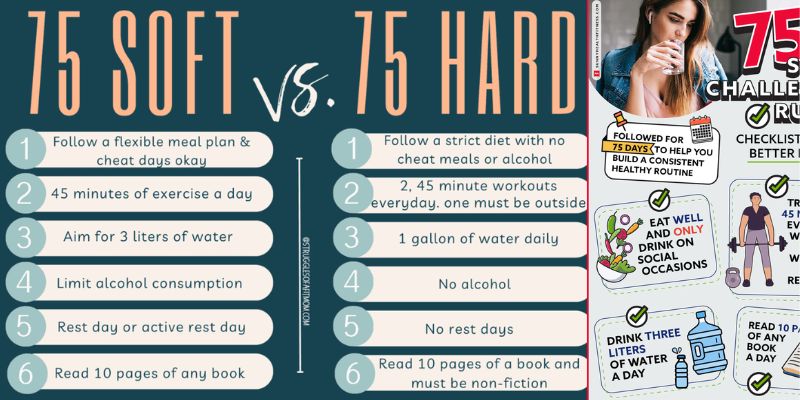As humans we all have many challenges in our daily lives. Hence it’s important we learn how to tackle them effectively. This article introduces a simple yet powerful 75 Soft Challenge you can apply to get better outcomes.
Get rid of Procrastination
- Break tasks down into smaller steps
- Set realistic deadlines for each step
- Remove distractions from your workspace
- Create accountability through commitments
- Reward yourself after completing tasks
- Take breaks between long sessions
- Forgive yourself if you slip up
Defeat Negative Self-Talk
- Celebrate small wins daily
- Write down positive affirmations
- Balance negative thoughts with positive ones
- Notice inner critic and shift perspective
- Ask “Would you say this to someone you love?”
- Identify triggers causing negative self-talk
Build Healthy Habits
- Add one habit at a time
- Make sure your goals are specific, measurable, relevant, and timely
- Make habits more convenient than excuses
- Use implementation intentions – “If X happens, then I will do Y”
- Make commitments public
- Practice gratitude to reinforce habits
Increase Mental Toughness
- Define purpose behind your efforts
- Focus on controllables and accept uncontrollables
- View obstacles as opportunities to practice resilience
- Learn optimism – look for silver linings in setbacks
- Establish self-care routine to manage stress
- Surround yourself with supportive people
- There are no tough times in life, only tough people!
Overcome Fear and Anxiety
- Name your fears – this releases their grip
- Challenge irrational fears with logical questions
- Visualize yourself succeeding despite the fear
- Reduce anxiety through breathing exercises
- Face small fears to build confidence tackling bigger ones
- Reward courage over comfort
- Seek support of others who faced similar fears
Beat Perfectionism
- Define “done” and “good enough” standards upfront
- Celebrate progress over perfection
- Ask – what is the cost of waiting for perfect conditions?
- Assess if finished product actually needs to be 100% perfect
- Balance perfectionism and pragmatism based on context
- Remember done beats perfect every time
Defeat Indecisiveness
- Identify must haves vs. nice to haves
- Set evaluation criteria before making comparisons
- Ask what does my intuition say? It’s often right.
- Start small if deciding feels overwhelming
- Commit to a decision and re-evaluate later if needed
- Accept occasional mistakes as learning opportunities
Beat Imposter Syndrome
- Recognize you’ve been hired/selected for a reason
- Keep record of accomplishments and positive feedback
- Share knowledge and help others too struggling
- Remember slipping up occasionally is normal for everyone
- Battle self-doubt with mantras like “I deserve to be here”
Increase Motivation
- Have an empowering reason behind your efforts
- Focus on finding value in the process, not just end goal
- Celebrate how far you’ve come regularly
- Review how completing tasks align with bigger goals
- Create accountability and status updates
- Compete with yesterday’s version of yourself
Build Confidence and Self-Esteem
- Identify core strengths and qualities
- Keep note of accomplishments and positive impacts made
- Set aside perfectionism and be kind to yourself
- Become your own cheerleader – speak positively
- Fake confidence and courage till it becomes natural
- Visualize yourself succeeding when self-doubt creeps up
Strengthen Growth Mindset
- View challenges as opportunities to learn and improve
- Replace “failing” with “learning – not there yet”
- Remember brains are malleable muscles that get better
- Embrace discomfort of hard tasks required for growth
- Reward action over outcome to reinforce mindset
- Surround yourself with growth-focused people
Overcome Loss of Motivation
- Recall why this matters to you
- List benefits of following through despite obstacles
- Seek inspiration from others who persevered
- Practice self-compassion – it’s normal to struggle sometimes
- Focus on specifics in your control
- Request support if feeling overwhelmed
- Celebrate returning on track! Progress isn’t linear
I hope this list of soft challenge rules empowers you to get better results. Save this checklist and revisit whenever you face mental roadblocks that impact performance. With consistent practice, you’ll notice increased confidence, resilience and consistency towards achieving your goals.
Conclusion
Tackling soft challenges related to mindset, motivation and attitude is critical for success. Though these challenges appear intangible, they significantly impact the results we get. Using the 75 simple yet effective rules listed, you can negative self-talk, fear, perfectionism and other such mental obstacles. By diligently applying these soft challenge rules, you will boost consistency, motivation and mental strength required to accomplish big goals. So save this checklist and keep referring to it whenever you face a soft challenge or notice yourself slipping up. With regular practice, you’ll see greater control over your mindset and dramatically better outcomes.
FAQs of 75 Soft Challenge
Q1: What are soft challenges?
Soft challenges relate to obstacles we face internally with regards to emotions, mindset, motivation levels, attitudes etc. Things like procrastination, fear of failure, negative self-talk fall under soft challenges.
Q2: How are soft challenges different from hard challenges?
Hard challenges involve external problems related to other people, resources, systems etc. Soft challenges on the other hand stem from our own thoughts, beliefs, attitudes.
Q3: Why is it important to tackle soft challenges?
Though soft challenges seem minor, they significantly impact the results we get. Issues like lack of motivation or confidence can derail our progress towards goals even when external conditions are favorable. Hence learning tools to overcome internal obstacles is key for success.
Q4: What are some examples of soft challenge rules?
Some examples include – break large tasks into smaller steps, celebrate small wins, face smaller fears to build confidence, compete with your past self rather than others, believe progress happens in a non-linear way.
Q5: How can the 75 soft challenge rules help me?
This checklist equips you with simple yet practical tools to overcome procrastination, negative self-talk, fear, perfectionism and other common soft challenges. Applying them consistently builds mental muscle required to accomplish big goals.







